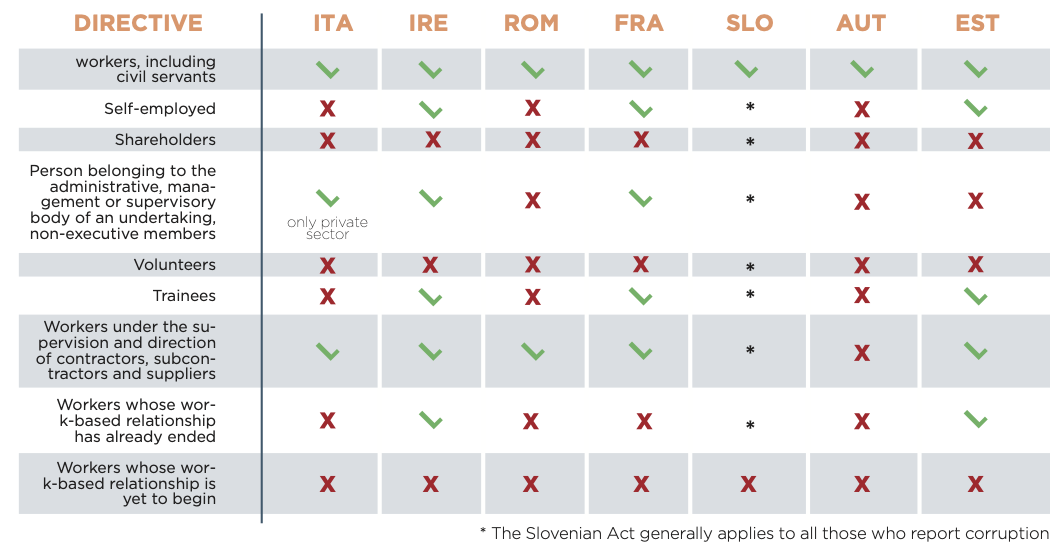Whistleblowing in Italy, Austria, Estonia, France, Ireland, Romania and Slovenia
2. Subjective field of application
 The Directive provides an extensive personal scope,
which not only includes persons having the status of
worker, including civil servants, but also persons having
self-employed status, shareholders and persons belonging to the administrative, management or supervisory
body of an undertaking, including non-executive members, as well as volunteers and paid or unpaid trainees
and any persons working under the supervision and
direction of contractors, subcontractors, and suppliers.
The Directive provides an extensive personal scope,
which not only includes persons having the status of
worker, including civil servants, but also persons having
self-employed status, shareholders and persons belonging to the administrative, management or supervisory
body of an undertaking, including non-executive members, as well as volunteers and paid or unpaid trainees
and any persons working under the supervision and
direction of contractors, subcontractors, and suppliers.
Most of the countries will have to modify their national law in implementing the Directive, as, while they all
recognise the figure of whistleblower in civil servants,
and almost all - except Austria - include workers under the supervision of contractors, subcontractors or
suppliers, none of them recognise volunteers or people
whose employment relationship has not yet started, or
shareholders. On the other hand, Estonia and Ireland include former employees.
Only Ireland explicitly includes freelancers and, together with France and Estonia, trainees.
Italian law, albeit only for the private sector, includes “persons serving
as representatives or holding administrative or senior
executive positions within the body or an organisational unit of same, and being financially and functionally
independent and persons exercising management and
control of same” and generally “persons subject to their
direction or supervision”. However, the latter definition
is too general and does not allow for it to be established
whether, in the private sector, other categories of workers identified by the Directive are included.
Another overly generic definition is found in the Slovenian Integrity and Prevention of Corruption Act. It applies to anyone who reports any kind of corruption to
the Commission and to officials who report any kind of
unethical or illegal conduct they have been requested
in their sphere of work. Therefore, the law does not expressly identify all of the various categories of workers
to which it applies – except for official persons - but is
generally addressed to everyone (and not only to workers).
From the countries examined, France is undoubtedly the one whose whistleblower legislation applies to the most categories of workers. The Constitutional Council has specified that the Sapin 2 Law procedure is limited to “whistleblowers making an alert against the organisation employing them or the one with which they collaborate in a professional context”. Consequently, the Sapin 2 Law applies to agents, holders or contract staff belonging to the structure subject to the obligation, to trainees and apprentices, as well as to external and occasional collaborators of the administration, bodies or communities concerned, such as voluntary users of the public service who actually participate in its execution, either as reinforcement or by substituting a public official.
